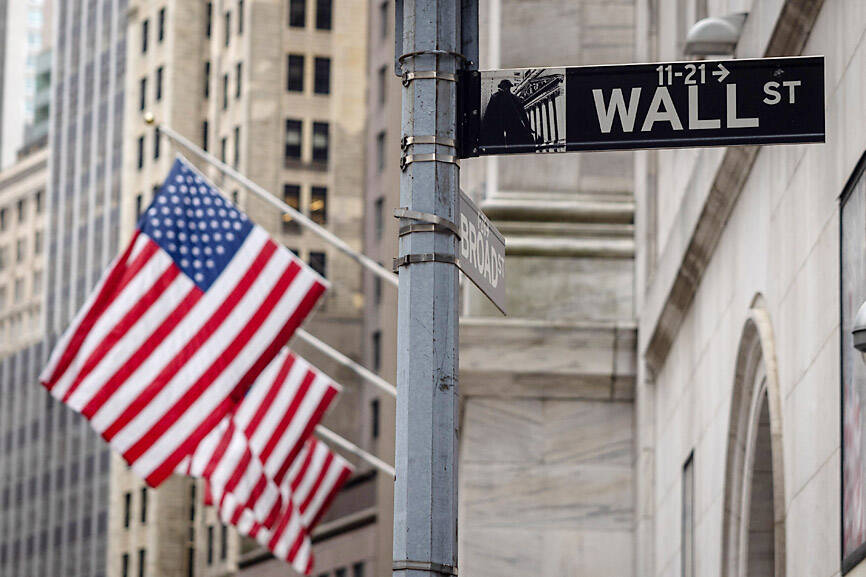The US remained the largest debtor nation to Taiwan’s banking sector in the final quarter of last year, as Taiwanese displayed a keen interest in US government and corporate debt, the central bank said yesterday.
The trend could sustain this year after the US Federal Reserve kept interest rates unchanged for three straight quarters and is considering rate cuts to support the economy if necessary, the central bank said.
Data compiled by the central bank showed that outstanding claims by Taiwan’s banking sector to the US totaled US$168.32 billion as of December last year, rising 10.8 percent to account for a 29.37 percent share.

Photo: AFP
High interest rates in the US have made its bonds an attractive investment and prices would rise once the Fed cuts interest rates, the central bank said.
Bonds and interest rates have an inverse relationship — when rates go up, bond prices go down, and when interest rates decline, bond prices rise, it said.
The exposure stemmed from short-term capital arrangements, rather than long-term investment in manufacturing facilities, it added.
China ranked second in terms of local lenders’ exposure at US$48.41 billion, a 4.84 percent increase from three months earlier, the central bank said.
The central bank attributed the advance mainly to the yuan’s appreciation against the greenback by 2.94 percent during the period.
Luxembourg and Australia were in third and fourth places respectively, followed by Hong Kong, the central bank said.
Japan and the UK were the sixth and seventh debt destinations at US$33.38 billion and US$19.7 billion respectively, it said.
Singapore rose four places to eighth, as the city-state gains importance as a regional financial hub.
South Korea and Vietnam occupied the ninth and 10th positions respectively, with exposure to Vietnam shedding 1.11 percent from three months earlier, the central bank said.

CHIP RACE: Three years of overbroad export controls drove foreign competitors to pursue their own AI chips, and ‘cost US taxpayers billions of dollars,’ Nvidia said China has figured out the US strategy for allowing it to buy Nvidia Corp’s H200s and is rejecting the artificial intelligence (AI) chip in favor of domestically developed semiconductors, White House AI adviser David Sacks said, citing news reports. US President Donald Trump on Monday said that he would allow shipments of Nvidia’s H200 chips to China, part of an administration effort backed by Sacks to challenge Chinese tech champions such as Huawei Technologies Co (華為) by bringing US competition to their home market. On Friday, Sacks signaled that he was uncertain about whether that approach would work. “They’re rejecting our chips,” Sacks

NATIONAL SECURITY: Intel’s testing of ACM tools despite US government control ‘highlights egregious gaps in US technology protection policies,’ a former official said Chipmaker Intel Corp has tested chipmaking tools this year from a toolmaker with deep roots in China and two overseas units that were targeted by US sanctions, according to two sources with direct knowledge of the matter. Intel, which fended off calls for its CEO’s resignation from US President Donald Trump in August over his alleged ties to China, got the tools from ACM Research Inc, a Fremont, California-based producer of chipmaking equipment. Two of ACM’s units, based in Shanghai and South Korea, were among a number of firms barred last year from receiving US technology over claims they have

It is challenging to build infrastructure in much of Europe. Constrained budgets and polarized politics tend to undermine long-term projects, forcing officials to react to emergencies rather than plan for the future. Not in Austria. Today, the country is to officially open its Koralmbahn tunnel, the 5.9 billion euro (US$6.9 billion) centerpiece of a groundbreaking new railway that will eventually run from Poland’s Baltic coast to the Adriatic Sea, transforming travel within Austria and positioning the Alpine nation at the forefront of logistics in Europe. “It is Austria’s biggest socio-economic experiment in over a century,” said Eric Kirschner, an economist at Graz-based Joanneum

BUBBLE? Only a handful of companies are seeing rapid revenue growth and higher valuations, and it is not enough to call the AI trend a transformation, an analyst said Artificial intelligence (AI) is entering a more challenging phase next year as companies move beyond experimentation and begin demanding clear financial returns from a technology that has delivered big gains to only a small group of early adopters, PricewaterhouseCoopers (PwC) Taiwan said yesterday. Most organizations have been able to justify AI investments through cost recovery or modest efficiency gains, but few have achieved meaningful revenue growth or long-term competitive advantage, the consultancy said in its 2026 AI Business Predictions report. This growing performance gap is forcing executives to reconsider how AI is deployed across their organizations, it said. “Many companies